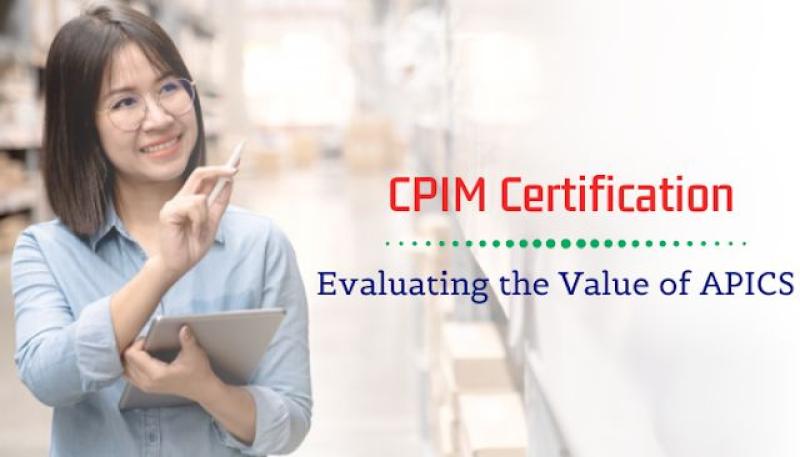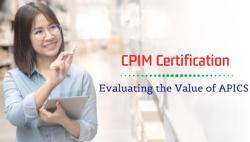What is CPIM training?
CPIM, which stands for Certified in Production and Inventory Management, is a professional certification offered by APICS (Association for Supply Chain Management). CPIM training is designed to equip individuals with the knowledge and skills needed in the field of production and inventory management. The CPIM program is widely recognized globally and is considered a valuable credential for professionals involved in operations and supply chain management.
Key components of CPIM training include:
CPIM Learning System:
- APICS provides a comprehensive CPIM Learning System, which is a set of educational materials designed to help individuals prepare for the CPIM exams. The learning system includes textbooks, online content, practice questions, and other resources covering the content of the CPIM exam modules.
CPIM Exam Content:
- The CPIM program consists of two main modules: Part 1 and Part 2. Each part covers specific topics related to production and inventory management. The content includes areas such as demand management, procurement and supplier planning, material requirements planning, capacity planning, sales and operations planning, and more.
Instructor-Led Courses:
- Many individuals choose to take instructor-led CPIM courses facilitated by APICS-approved education providers. These courses are led by experienced instructors who guide participants through the CPIM content, provide additional insights, and facilitate discussions.
Self-Study:
- CPIM training also allows for self-study using the CPIM Learning System provided by APICS. This option is suitable for individuals who prefer to study at their own pace and have the discipline to engage in independent learning.
Practice Exams:
- As part of CPIM training, individuals often take practice exams to assess their understanding of the material and familiarize themselves with the exam format. Practice exams help identify areas that may require additional focus.
Exam Preparation Workshops:
- Some training providers offer CPIM exam preparation workshops to provide focused and intensive review sessions. These workshops may include a review of key concepts, exam-taking strategies, and practice questions.
Online Resources:
- In addition to the CPIM Learning System, APICS and other organizations may provide online resources, webinars, and forums where individuals can engage with the CPIM community, ask questions, and access supplementary materials.
Interactive Learning:
- CPIM training often includes interactive learning experiences, such as case studies and simulations, to help participants apply theoretical knowledge to real-world scenarios.
Exam Registration:
- After completing the training, individuals can register for the CPIM exams. The exams are computer-based and assess the candidate's understanding of the concepts covered in Part 1 and Part 2 of the CPIM program.
Successful completion of both CPIM exam parts leads to earning the CPIM certification. CPIM training is valuable for professionals seeking to enhance their knowledge in production and inventory management, advance their careers in supply chain management, and demonstrate their expertise in optimizing production and inventory processes within an organization.
What are the core modules covered in CPIM training?
The APICS CPIM (Certified in Production and Inventory Management) program comprises five core modules that delve into crucial aspects of supply chain and operations management. Each module emphasizes practical applications and equips candidates with the knowledge and skills to address real-world challenges. Here's a breakdown of the key areas covered:
Module 1: Basics of Supply Chain Management (BSCM):
- Provides a foundational understanding of supply chain concepts, processes, and terminology.
- Covers topics like supply chain strategies, forecasting, demand planning, and inventory management fundamentals.
- Explores various types of inventory models and their applications.
Module 2: Master Planning of Resources (MPS):
- Focuses on developing and managing aggregate production and inventory plans.
- Covers sales and operations planning (S&OP), rough-cut capacity planning (RCCP), and material requirements planning (MRP).
- Emphasizes the importance of demand management, capacity planning, and resource allocation in optimizing production flows.
Module 3: Detailed Scheduling and Planning (DSP):
- Equips you with the skills to create detailed production schedules and manage shop floor activities.
- Covers work order scheduling, capacity requirements planning (CRP), and finite scheduling techniques.
- Explores various scheduling algorithms and their implications for production efficiency.
Module 4: Execution and Control of Operations (ECO):
- Guides you through the execution of production plans and monitoring performance against established metrics.
- Covers topics like shop floor control, inventory control, quality control, and data analysis.
- Emphasizes the importance of problem-solving skills, continuous improvement, and corrective action procedures.
Module 5: Distribution (Dis):
- Focuses on the efficient management of finished goods within the supply chain.
- Covers topics like warehousing, transportation, order fulfillment, and customer service.
- Explores various distribution strategies and their impact on overall supply chain performance.
In addition to these core modules, APICS also offers elective modules that allow you to further specialize in specific areas of interest, such as lean manufacturing, project management, or global supply chain management.
Remember, the specific learning approach and materials may vary depending on the training provider you choose. However, the core modules outlined above provide a solid foundation for understanding the comprehensive body of knowledge covered in the APICS CPIM program.
If you have any further questions about the specific content or learning objectives of individual modules, feel free to ask!




